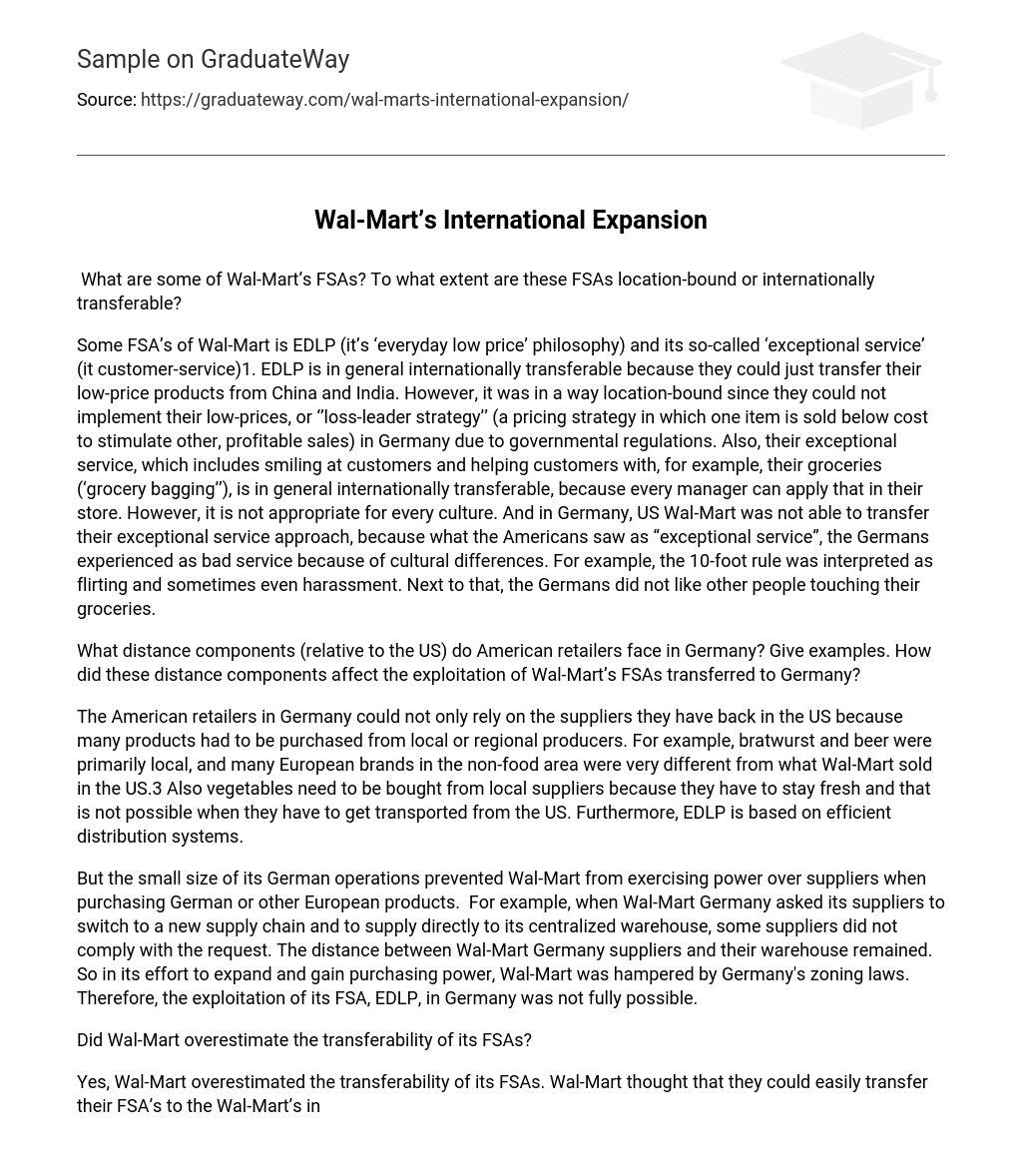What are some of Wal-Mart’s FSAs? To what extent are these FSAs location-bound or internationally transferable?
Some FSA’s of Wal-Mart is EDLP (it’s ‘everyday low price’ philosophy) and its so-called ‘exceptional service’ (it customer-service)1. EDLP is in general internationally transferable because they could just transfer their low-price products from China and India. However, it was in a way location-bound since they could not implement their low-prices, or ‘’loss-leader strategy’’ (a pricing strategy in which one item is sold below cost to stimulate other, profitable sales) in Germany due to governmental regulations. Also, their exceptional service, which includes smiling at customers and helping customers with, for example, their groceries (‘grocery bagging’’), is in general internationally transferable, because every manager can apply that in their store. However, it is not appropriate for every culture. And in Germany, US Wal-Mart was not able to transfer their exceptional service approach, because what the Americans saw as “exceptional service”, the Germans experienced as bad service because of cultural differences. For example, the 10-foot rule was interpreted as flirting and sometimes even harassment. Next to that, the Germans did not like other people touching their groceries.
What distance components (relative to the US) do American retailers face in Germany? Give examples. How did these distance components affect the exploitation of Wal-Mart’s FSAs transferred to Germany?
The American retailers in Germany could not only rely on the suppliers they have back in the US because many products had to be purchased from local or regional producers. For example, bratwurst and beer were primarily local, and many European brands in the non-food area were very different from what Wal-Mart sold in the US.3 Also vegetables need to be bought from local suppliers because they have to stay fresh and that is not possible when they have to get transported from the US. Furthermore, EDLP is based on efficient distribution systems.
But the small size of its German operations prevented Wal-Mart from exercising power over suppliers when purchasing German or other European products. For example, when Wal-Mart Germany asked its suppliers to switch to a new supply chain and to supply directly to its centralized warehouse, some suppliers did not comply with the request. The distance between Wal-Mart Germany suppliers and their warehouse remained. So in its effort to expand and gain purchasing power, Wal-Mart was hampered by Germany’s zoning laws. Therefore, the exploitation of its FSA, EDLP, in Germany was not fully possible.
Did Wal-Mart overestimate the transferability of its FSAs?
Yes, Wal-Mart overestimated the transferability of its FSAs. Wal-Mart thought that they could easily transfer their FSA’s to the Wal-Mart’s in Germany. Their FSA’s were a big success in the US, so they thought that the FSA’s also will be a success in Germany. Little did they know that Wal-Mart’s FSAs weren’t experienced by the Germans as great at all, as already explained in the answer to question one. So, they did overestimate the transferability of its FSAs.
Can you provide an update on Wal-Mart’s international expansion, using materials available on the Web?
On http://corporate.walmart.com/our-story/our-business/international: “Walmart became an international company in 1991, and we operate in 26 countries outside the United States. With more than 800,000 associates and over 5,500 stores internationally, we leverage our global resources to meet local needs. Walmart International is currently the fastest-growing part of our business and is led by President & CEO Doug McMillon.
Learn more about some of our most important social, environmental, and company initiatives within each market we serve, as we bring value to customers and communities around the globe.”
On the website, you can find many links on Wal-Mart’s policy in each of the countries. You can see that their policy in each different country is very different and comprehensive. They really focus on very location-bound aspects in every country. For example, in Africa, they work with school nutrition programs, anti-malaria initiatives, and small market farmer access, etc. so that the establishment of Wal-Mart in Africa will really be worthwhile for Wal-Mart itself in the future as well as the people of Africa.





